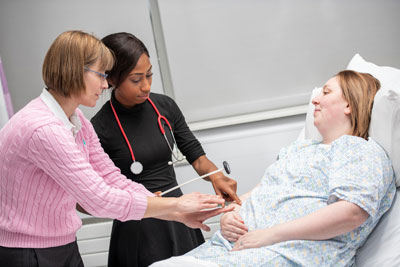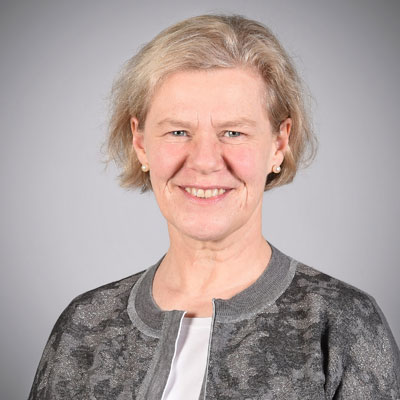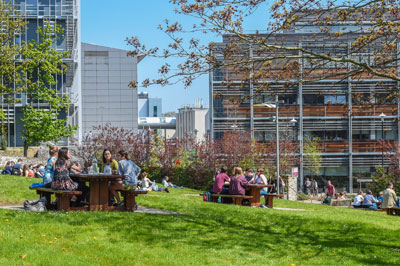Exciting opportunity to study medicine at the University of Aberdeen

Clinical Skills
The University of Aberdeen, the UK’s fifth oldest university, was founded in 1495 by William Elphinstone, Bishop of Aberdeen and Chancellor of Scotland. In 1497 the University of Aberdeen was first in the English-speaking world to create a chair of medicine. We are currently ranked in the top 30 UK universities (Complete University Guide 2020) and this year are celebrating 525 years since our foundation.
This long history of excellence in teaching and learning speaks for itself, but as a modern forward-thinking university, the University of Aberdeen continues to look to the future. Throughout our history, we have evolved and innovated in response to worldwide developments in both healthcare and education. We are now very proud to embark on a new international pathway to our highly regarded five-year medical degree (MBChB). The Sri Lanka Medical Pathway will support the development of outstanding doctors for the future who will have the knowledge, skills and attitude to work anywhere in the world.
The University of Aberdeen MBChB degree
Training doctors for local communities was one of the original remits for the University of Aberdeen in 1495. Today, our five-year MBChB medicine degree continues to be highly regarded across the world. We are currently ranked 1st in Scotland and 2nd in the UK for medicine (Guardian University League Tables 2020). The programme is fully approved by both the General Medical Council and the Sri Lanka Medical Council and our graduates go on to work across the world. Our medical students regularly win national prizes, present research at international scientific conferences every year, and have set up successful healthcare companies. Our medicine graduates provide excellent healthcare, on a daily basis, across the world.
The University of Aberdeen MBChB degree curriculum follows a systems based integrated approach across Years 1 to 3. Students learn the underpinning medical science, clinical knowledge and clinical skills for each of the body systems in turn. At the same time the students are developing their clinical skills in both our highly regarded Clinical Skills Centre and in real life clinical practice with excellent doctors in both community and hospital-based practice. In years 4 and 5, the students are almost exclusively in clinical practice learning and working with clinical teams. A series of Professional Practice Blocks and Student Selected Component’s, where students develop their research skills and areas of interest, run across all five years of the curriculum. The students have the option of an intercalated degree (either a BSc focusing on medical sciences or medical humanities between Year 3 and 4 or Year 4 and 5. Between Years 3 and 4, the intercalating degree options available to students are to achieve a BSc with a medical sciences (e.g. anatomy, immunology, physiology, sports science) or a medical humanities focus. Between Years 4 and 5 there are further intercalating options as students can chose from the wide range of Masters programmes provided by the School of Medicine, Medical Sciences and Nutrition e.g. the Masters in Public Health, Masters in Global Health, Masters in Medical Imaging.

Professor Rona Patey
The Sri Lanka Medical Pathway
The Sri Lanka Medical Pathway (SLMP) provides an exciting new route to the University of Aberdeen MBChB degree and our first student cohort joined our medical school last August. Students follow the full curriculum described above, but in addition they gain invaluable experience of two healthcare systems in two countries to equip and prepare them for the world- wide medical workplace. An overview of the SLMP is provided at www.abdn.ac.uk/sri-lanka
The SLMP students begin their studies in the UK in Aberdeen, joining the existing cohort of around 200 medical students based at our Foresterhill Campus, which is one of the largest healthcare campuses in Europe.
The students have access to state-of-the-art anatomy facilities, the latest simulation technology in our purpose-built Clinical Skills Centre and our simulation ward, which has been collaboratively developed with our clinical partners in Aberdeen, NHS Grampian. The simulation ward is based in one of the teaching hospitals on the Foresterhill site and is designed to provide learning experiences for healthcare students and healthcare staff. Students are taught by experienced educators, doctors and other clinicians and researchers who are at the forefront of modern medical education, clinical practice and medical research.
Early patient contact is at the heart of our programme. Students work with our experienced patient partners in the Clinical Skills Centre and have both community and hospital clinical experience from year one. Across Years 1 to 3 the clinical contact time will steadily increase as students build on the underpinning knowledge and skills that are required for modern worldwide healthcare, whilst also learning in and about the UK National Health Service.
After successful completion of Year 3 students enter Year 4 of the University of Aberdeen MBChB programme and transfer to Sri Lanka for the next phase of their medical training. In the final two years of the SLMP they will be based in clinical practice in Colombo, Sri Lanka where there are outstanding opportunities for clinical learning in a new healthcare context. Many of the clinical placements in Sri Lanka will be undertaken at excellent facilities provided by Asiri Health, a leading private healthcare provider in Sri Lanka, at 3 hospitals in Colombo as well as hospitals in the Southern and Central regions of Sri Lanka.
The SLMP has been designed to give students unique and outstanding clinical learning opportunities and experience of two healthcare systems whilst gaining the University of Aberdeen MBChB degree. The students will gain experience of the healthcare challenges that exist across the world but also learn about the importance of local challenges and contexts in the provision of optimal systems for healthcare.
The University of Aberdeen Medical School is a UK General Medical Council (GMC) recognised body for awarding UK medical degrees. As per GMC guidance, all new programmes must undergo a Quality Assurance review. These additional approval processes are well underway for the SLMP.
To support students studying on the SLMP we are collaborating with the International Institute of Health Sciences (IIHS), one of Sri Lanka’s leading healthcare training institutes. With University of Aberdeen faculty and administrative staff based in Sri Lanka, colleagues from IIHS will provide access to their educational facilities for SLMP students. Student advice and support regards to accommodation, visa requirements and other matters relating to the period of transfer to Sri Lanka will also be facilitated by IIHS staff.
Entry to the Sri Lanka
Medical Pathway
Students will normally have achieved AAA in three GCE A-levels with two sciences, one of which should be chemistry. Students who sit the Sri Lankan A-levels will normally have three A-levels, achieving at least AAB. For those students who have studied the International Baccalaureate, it is anticipated that they will achieve three subjects at Higher Level at least at grade six, including chemistry and one other science, and three other subjects at Standard level at an average of at least grade six.
There are some important additional points for those students who may wish to work in Sri Lanka after graduation. The Sri Lanka Medical Council requires that these graduates had three A-Levels in chemistry, biology and physics when they entered medical school and that they obtained an eligibility certificate from the Council at that time. You can find out more about our entry requirements here: www.abdn.ac.uk/sri-lanka

Suttie Centre Foresterhill Campus
Modern healthcare requires multi-professional teamwork and so Medical School Admissions Teams are interested in skills such as communication, teamwork, leadership and prioritisation. In addition, the excellent doctor will accept responsibility, problem solve, demonstrate empathy, be resilient and be prepared to deal with the uncertainty that is ever present in healthcare. Therefore, UK Medical Schools including the University of Aberdeen now consider and score much more than just excellent academic grades in deciding who will be offered a place. You would be required to undertake the UCAT which tests skills such as decision making and situation judgement. As an international applicant you will also be required to demonstrate sufficient English skills and to undergo a multiple mini interview where there will be questions around issues such as: professionalism; your learning from the achievements you described in a personal statement and the core qualities of a doctor. We recognise the challenges of preparing an application for medicine, wherever this might be. You may find the websites listed in the further information box helpful.
We are delighted to be offering this exciting opportunity for students to study medicine. Full details about the programme and how to apply are
available at www.abdn.ac.uk/sri-lanka or speak to staff on (+94) 763422446.
By Professor Rona Patey, Director, Institute for Education in Medical and Dental Sciences



